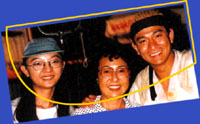
"It is very stressful," Cheph describes her work. "Especially with very established directors who don't talk about limitations, you need to give them options." She relates how a director once insisted that all the glasses to be used as props be made of crystal. As the budget did not allow such lavish spending, she had to be tactful enough to convince the director of the constraints faced.
Cheph did so by asking about the kind of shots that would be taken of the scenes - whether they would be wide, medium or close-up shots. By sheer ingenuity which she calls "common sense", she managed to cut down the request to two crystal glasses without having to compromise on quality.
Sometimes, the director can demand the impossible. Once, she was given the thankless task of getting permission from the owners of a luxury house to shoot at their home. The wealthy owners refused, and Cheph had to alternately show a poker face, plead, and beg to get the reluctant owners, consent.
"Some directors can be quite unreasonable. They think that the money they have can buy everything. At times, those without the money to offer would also be adamant about getting this and that!" Cheph shares, amused.
The insane things that Cheph had to do, and the vast amount of energy that she had to put into her work had put resilience in her. "Once, we had to forgo sleep for five days to get a shoot done properly. Nowadays, almost nothing is impossible to achieve." she reckons. "Which is why I've returned to Malaysia. I want to help the local film industry. If I don't contribute in this way, I don't think I'll be able to sleep!"Cheph agrees that the Malaysian film industry is still in its infant stage. She observes that local films have improved in quality over the last ten years, although if we look back to the P. Ramlee era, there is an undeniable drop in grade.
She conjectures that this could perhaps be attributed to the fact that many of P. Ramlee's movies were produced under the now-defunct Shaw Brothers organisation which offered their knowledge and technical know-how to the locals.
Wanting to be on neutral ground, Cheph says that she still has a lot to learn about the local rules, culture and sensitivities before making any further comments. Eventually, however, she hopes to know the country and its people well enough to be able to produce the Great Malaysian Movie. Or rather, the Great Malaysian Movie which is commercial enough in appeal to draw the cinema-going crowd.
"Some movies, including Vietnam's Scent of Green Papayas, and China's Raise The Red Lantern are, from the film-maker's point of view, perfect," she argues. "However, they are what we call art films. From the business point of view, I would not produce such films. As a producer, you have to handle the `upstairs' and the `downstairs'. So you would want to produce something that is beautiful and yet has elements of mass appeal."
One day Cheph hopes to produce a feature film that will depict Malaysians as they are - something which is culturally sensitive and accurate, and which uses authentic language. At the same time, for the movie to succeed, it has to have some `action' scenes.
She believes that as the world becomes more interested in our multi-ethnic society, there will be a demand for good Malaysian movies. The time may not be right as yet. Cheph says that when we do eventually produce such a movie, we need to hit right, and hard, or we are not likely to recover. Cheph also believes that the Malaysian film industry can indeed benefit from the expertise Hong Kong offers. At this point, cynics might roll their eyes, sneering at the standard of movies from the latter country.
She unhesitatingly admits that the overall quality of Hong Kong movies has been on a decline. Still, Cheph points out, film-makers from the West have long been `stealing' ideas and getting inspiration from Hong Kong movies, especially the action ones.
Apparently, Sylvester Stallone rents and watches many of Jackie Chan's movies before coming up with ideas for his own. Western film-makers have also been found foraging for ideas on Hong Kong film sets! But perhaps the most revealing point is the American's `sudden' interest in Jackie Chan (his movie, `Rumble In The Bronx' went to No. 1 in the US movie chart), and in the director John Woo, among others.
To Cheph, this signifies that the West is at last openly admitting the worth of these Hong Kong-made movies after years of silent admiration. It also shows that film-makers are "running out of ideas, and that the audience's taste is changing."
"Movie-making is about timing. You can rarely predict what the audience wants because tastes keep changing. But generally, you have the case of the West emulating the East, and vice versa."
Cheph feels that if expertise from the two worlds could be fused - with the west providing special effects and skills in cinematography, and the East real-live stunts - the result would be spectacular.
Until such time, Cheph is going to keep herself busy studying the local culture, and also with her newly set up company which produces movie-themed phone cards. With her wealth of experience, her astute business sense, and her charm, it will not be long before we get to hear more of Cheph, producer extraordinaire, and the promised Great Malaysian Movie.
![]()
![]()
![]()
back
| main | top | other people | back to Mir

